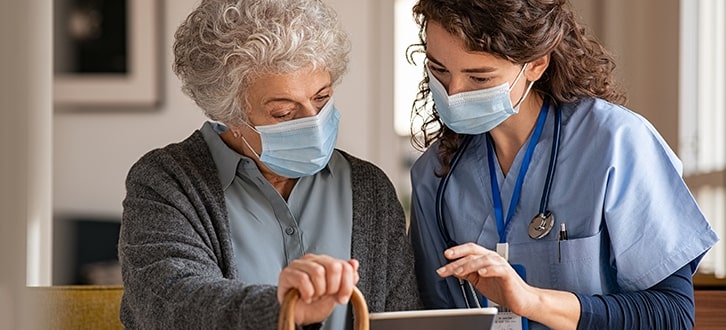Frequently asked questions about COVID-19 vaccines
Author: CenterWell Pharmacy
Date Posted: May 07, 2021

Q: How many COVID-19 vaccines are there?
A: Currently, the Centers for Disease Control and Prevention (CDC) has authorized 3 vaccines to protect you against serious complications from the COVID-19 virus.
- Pfizer-BioNTech COVID-19 vaccine (2-shot vaccine)
- Moderna COVID-19 vaccine (2-shot vaccine)
- Johnson & Johnson’s Janssen COVID-19 vaccine (1-shot vaccine) Note: For women younger than 50, there is a rare risk of blood clots with low platelets following vaccination.
To learn more about the COVID-19 vaccines, watch the Humana Neighborhood Center’s “COVID-19 vaccine: Get the facts” on-demand class. You can also visit Humana’s frequently asked questions (FAQ) about the COVID-19 vaccines page.
Q: What are the most common side effects from getting a COVID-19 vaccine?
A: Just like your yearly flu shot, you may have some side effects after getting vaccinated for COVID-19. Don’t worry—side effects are normal signs that your body is building protection against the virus.
The most common side effects:
- Pain and swelling in the arm where you received the shot
- Fever, chills, tiredness and headache
Learn more about what to expect after getting a COVID-19 vaccine.
Q: When can I get a COVID-19 vaccine?
A: Your state health department has the latest information on when you’re eligible to get a COVID-19 vaccine. Most states prioritize certain groups who have a higher risk of getting COVID-19 or becoming seriously ill from it, such as those over the age of 65 or frontline workers.
Q: Where can I get a COVID-19 vaccine?
A: You can get a COVID-19 vaccine at your local health department, mass vaccination site, retail pharmacy, hospital, federal qualified health centers or your primary care doctor if they have the vaccine available and you’re eligible.
Wherever you go to get a COVID-19 vaccine, it’s important to confirm the provider or location is safe and reputable to avoid becoming a victim of fraud. It’s also important for you to bring a government-issued ID with you when you get your vaccination.
Q: I’m eligible to receive a COVID-19 vaccine. How do I make an appointment?
A: We recommend using the free resources below to help you find a COVID-19 vaccine appointment near you.
- Retail pharmacies with the COVID-19 vaccine
- National Public Radio (NPR)’s COVID-19 vaccine tool
- CDC COVID-19 vaccine finder
- GoodRx COVID-19 vaccine finder
If you need assistance with making an appointment online, ask a trusted family member or friend for help.
Q: Do I have to pay for a COVID-19 vaccine?
A: No, you don’t have to pay for a COVID-19 vaccine. Humana members with commercial, Medicare and Medicaid plans can get the COVID-19 vaccine for free thanks to the federal government.
If you’ve been vaccinated and you received a bill, here’s how you can file for reimbursement from Humana.
- Print and complete all requested information on the correct COVID-19 vaccine Health Benefits Claim Form below:
- Moderna vaccine claim form
- Pfizer vaccine claim form
- Johnson and Johnson vaccine claim form (listed under Johnson & Johnson subsidiary Janssen®)
- Include the original itemized bill(s) you paid.
- Mail the completed form with the original itemized bill(s) to the address on the back of your Humana member ID card.
It may take up to 30 days to process your claim. Humana will send your reimbursement will be sent as a check to the home address Humana has on file for you.
Q: Are COVID-19 vaccines safe for me if I have an underlying medical condition?
A: Yes, as long as you haven’t had an allergic reaction to a COVID-19 vaccine or any ingredients in the vaccine. If you have concerns, we recommend speaking with your primary care doctor. To learn more, read the latest guidance from the CDC on getting vaccinated with underlying health conditions.
Q: I’ve had COVID-19, and I’m recovered. Do I still need to get vaccinated?
A: If you’ve had COVID-19, the CDC recommends getting a COVID-19 vaccine to prevent re-infection because it’s not known how long your “natural protection” will last. You may need to delay your vaccination until 90 days after your COVID-19 diagnosis. For questions, we recommend speaking with your primary care doctor or local health department.
Q: How long will it take for me to be fully vaccinated against COVID-19?
A: You’re not fully vaccinated when you receive your last shot. You’ll need to wait 1-2 weeks after your last shot to be fully vaccinated against COVID-19. This is because your body needs time to build up protection against the virus.
For COVID-19 Updates
The Centers for Disease Control and Prevention (CDC) is your best source of information as the COVID-19 situation evolves. We encourage you to visit the CDC website regularly for the most accurate and up-to-date news.